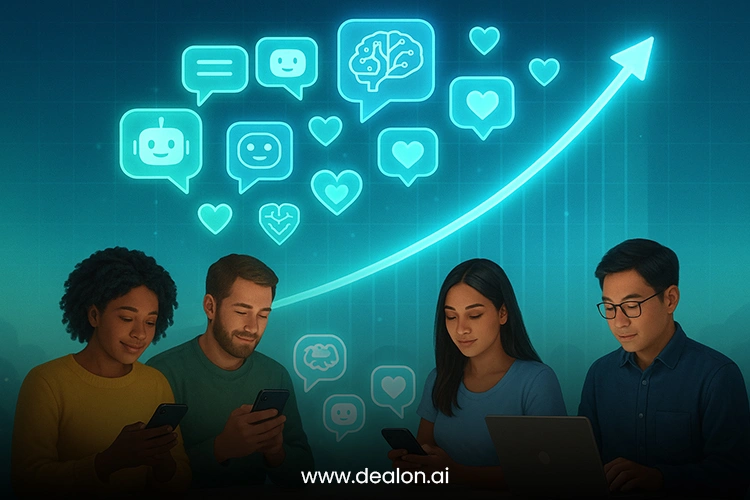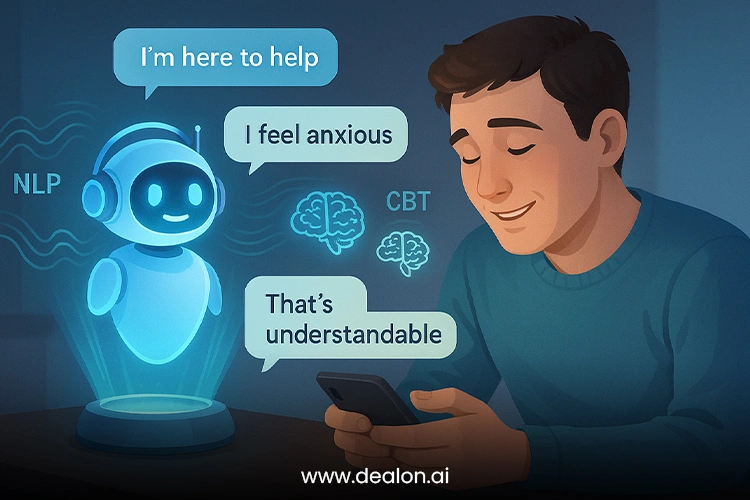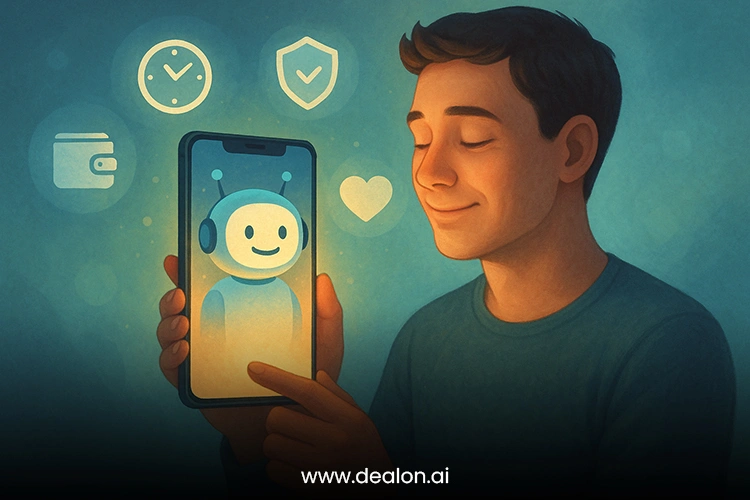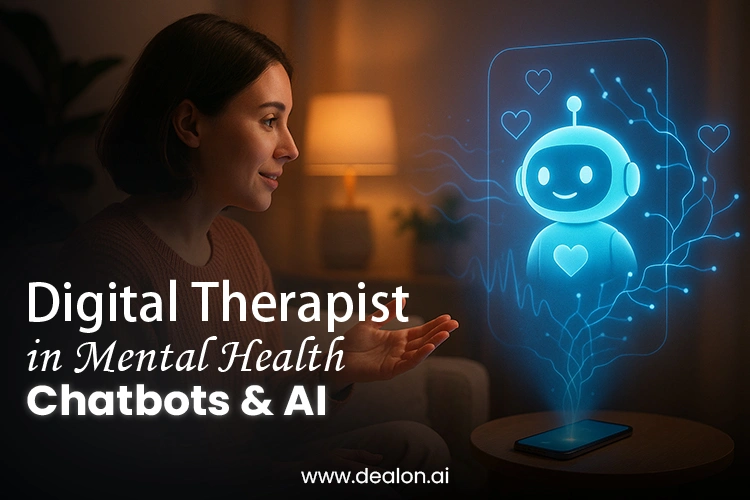Artificial Intelligence (AI) is a new concept in the constantly changing field of medicine, specifically in the area of mental health. The emergence of a new generation of AI-based chatbots is one of the most promising developments in this technology, and it is quickly transforming the way we deal with emotional wellbeing and therapeutic assistance. With the COVID-19 pandemic alone impacting millions of people from all regions of the planet, these digital therapists provide an outstanding chance to solve the mental health pandemic issue. With the use of machine learning algorithms and natural language processing (NLP), AI chatbots will be able to supply immediate, customized, and confidential support to the people who need emotional help.
Unlike the traditional therapy that can be associated with a long waiting list, high expenses, and a considerable stigma, digital therapists are a low-barrier and accessible solution. Being able to simulate the appearance of human-like conversation and using evidence-based therapeutic approaches like Cognitive Behavioral Therapy (CBT), the introduction of AI chatbots is not only an effective way of offering immediate support to people who want to get quick relief, but also an opportunity to help individuals who do not have access to professional mental health care. The convergence of such sophisticated technologies will enable users to have a sensitive and contextually relevant conversation and thus allow them to have a significant therapeutic engagement.
The implementation of AI in mental health care will be a remarkable paradigm shift and lead to an era when the location of people, monetary issues, or social factors will not be able to limit mental health. AI chatbots can potentially transform the way such care is provided. Here in this blog, we look further into how AI chatbots are changing the future of therapy, the incredible potentials that come with it, and the ethical bend that aids and abets this digital transformation in mental health care.
Also Read: Salesforce Einstein vs Zoho CRM AI for Customers
AI in Mental Care Rise

Over the past years, the impact of Artificial Intelligence (AI) on the field of mental health care has been growing at an exponential rate. It promises to provide a new spirit of addressing perennial problems inherent in conventional therapeutic measures. With mental illnesses, including anxiety disorders, fluctuations, and PTSD that still affect millions of people across the globe, AI can be viewed as a new tool to fill the gap between the patient and care.
Mentally, seeking mental health services has historically been impeded by physical obstructions, long waitlists, geographical accessibility, and high prices. Such obstacles have caused a considerable number of people to fail to get effective or prompt care. Nevertheless, the AI-driven tools are transforming the sector by offering easier and quicker channels of support.
The leading example of this movement is the AI-powered chatbots, or so-called virtual therapists. Such digital assistants are based on the most advanced technologies to simulate a therapeutic dialogue, providing a person with a responsive and understanding user experience. NLP gives such chatbots the capability of understanding and reading human emotions and enables them to have meaningful observations and conversations with the user.
Computer learning goes another step further and also improves these interactions by making the responses according to the individual’s unique needs. Through which the virtual therapists can provide personal advice using cognitive-behavioral methods, encouraging the development of emotional stability, stress control, and improved thinking process.
However, unlike conventional therapy, which has frequent scheduled appointments and long waiting times, AI chatbots are accessible at all times and can offer real-time assistance. The anonymity present is also a benefit to the users in that they do not feel judged or stigmatised, which allows them to express their emotions openly due to the environment created by the anonymity. Through the power of AI, these virtual therapists will democratise mental wellbeing, making it cheaper, more convenient, and easier to access for more people. With the development of technology, the application of AI in mental health care is on the threshold of becoming inevitable to meet the increasing global demand in the sphere of care.
The Working of Chatbots as Digital Therapists

The mode of assisting people to access and follow up on mental health was a serious threat that can be changed by the use of these chatbots, which resemble humans in conversational methods. The functionality of these AI systems integrates the latest methodologies in the spheres such as NLP and cognitive behavioral therapy (CBT), thus allowing them to provide real-time, individually-conducive support in managing the broadest possible range of mental-related afflictions. To get a better idea of how these digital therapists work under the hood, let us proceed.
Natural language processing (NLP): The gateway to a bridge between humans and AI
Natural Language Processing (NLP) is an AI technology at the core of any successful chatbot that allows chatbots to understand, interpret, and respond to human language as it would occur in real life. NLP gives digital therapists skills and techniques to analyze written text input provided by a user, interpreting underlying emotions, tone, and meaning. It is a potent tool since even AI chatbots can become capable of identifying emotional signals, language style, and other contextual nuances to address them specifically and according to the emotional and mental state of the user.
Another example is that when a user goes to a portal, feeling hopeless or anxious, the chatbot is capable of recognizing the negative emotional words used and changing the response to reflect an empathetic and supportive reply that is in the context of the subject matter. This two-way interaction is a form of empathetic interaction that resembles the one that would take place within the context of a therapeutic setting. Chatbots learn by machine learning continuous language skills, and as a result, are gradually getting better at reading between the lines of user input, picking up on subtleties of emotion, like sarcasm, frustration, or sadness.
Evidence-Based Support Cognitive Behavioral Therapy (CBT) Integration:
Another defining element of numerous AI-based chatbots is evidence-based therapeutic methods, and Cognitive Behavioral Therapy (CBT) is one of their most prominent ones. CBT is a long-established form of therapy that strives to enable people to recognize and change adverse thinking patterns, therefore, promoting healthier emotional reactions and adaptive behavior.
Digital therapists can teach users with the help of structured exercises, which challenge their cognitive distortions through the incorporation of CBT techniques into their design, e.g., making users repeat tasks involving catastrophizing, black-and-white thinking, or overgeneralization. As an example, the chatbot can help users see through the thought process that was expressed, such as I am a loser, I cannot cope with this and, thus, ask questions such as, With what evidence do you believe this to be true or, Is there a less extreme way to interpret this situation?
Also, these chatbots will assist a user in establishing essential coping skills to cope with stress and anxiety, including relaxation, mindfulness techniques, and activation strategies. Through strengthening the habit of positive thinking and offering on-time activities, through the values of the concept of an AI chatbot, users will be able to deal with the discomfort that surrounds them during tough times and incorporate healthier methods of coping with daily struggles.
Real-Time Support and Anonymity: Just-in-time Relief When It Is Needed Most.
The real-time support that AI-powered chatbots can offer is one of the most convincing benefits, as it cannot be provided in the case of traditional therapy. Mental ailments are highly indefinable, and anybody can feel heavily stressed or depressed at any time. To others, enduring long queues or waiting until they receive the next appointment to receive therapy can increase the feeling of distress. AI chatbots, however, are accessible at all hours of the day and night; they can present an easier, immediate point of release in times when urgent emotional help is required.
The ease of live interaction guarantees the users an opportunity to interact with these digital therapists according to their capability, without the burden of scheduling and time-consuming sessions. This immediate access brings some relief to people, and they can express, ventilate, and seek advice during periods of crisis. In addition, AI chatbots offer such an essential level of anonymity that usually eliminates stigma related to mental health care. Certain people do not want to turn to professionals because they do not want to be judged or perceived by society.
Chatbots, nonetheless, provide a secure and intimate setting in which a person can be open and share his/her feelings without being afraid of impressing anyone on them. This anonymity fosters opportune conversation even by those who would otherwise feel awkward giving specific difficulties to a therapist or even close friends. Such a blend of instantaneous assistance and anonymity creates the atmosphere of power among the users.
It contributes to the first step in the improvement of mental health care without any pressure of judgment or fear of being socially unacceptable. It teaches people to ask for assistance when they feel weak and offers the instrument to make them feel balanced again emotionally.
AI Chatbots’ Usefulness in Mental Health

Mental health care has become a new revolutionary breakthrough by incorporating AI chatbots, and this is not a mere fad since its implementation plays an enormous set of benefits, completely revolutionising the treatment experience and practice of receiving therapeutic assistance.
Although their most obvious strength is their accessibility, AI chatbots also raise an enormous number of additional benefits that should further contribute to the improvement of the mental health care experience. These online therapists deliver real-time relief, level access to treatment, offer confidentiality, and also serve to relieve overworked mental health professionals. These are some of the main advantages discussed below.
Emergency help: Support in the Time of Need
Mental health issues are unpredictable and may happen at any time, in the middle of the night, on the weekend, or during a period of increased stress. The delay involved in even consulting a therapist or a counselor may worsen the feeling of isolation and emotional distress to a point where individuals might have to decipher their problems. The chatbots feature live support and will provide a user with an on-demand response whenever they are most needed.
Chatbots represent a quick way of expressing oneself, whether a person is in the middle of an anxiety attack, they are inundated with sadness, or is just seeking some form of reassurance. Through coping skills or reframing options, or even a listening ear, these chatbots can work to reduce acute distress, helping them through stabilization of emotions in real-time.
Affordability and Accessibility: Mental Health Support To All
High cost and, at times, inaccessibility of traditional therapy make it relevant to a small section of the population, mainly in rural or underserved communities. Employing AI chatbots helps to dismantle these accessibility obstacles because mental health support can be reached at low or no cost. Chatbots are affordable or free, and so go a long way in solving the problem of many unable to access conventional treatment modes due to affordability.
Moreover, being digital and available on smartphones or computers, such chatbots have no geographic status, as they provide people with mental health support, no matter whether they might have low resources in their specific area. This way, AI-powered chatbots democratize mental health care: it can be expected that quality support will be accessible to everyone, no matter their financial state and place of residence.
Privacy and Confidentiality: Safe Place to be Vulnerable
AI chatbots allow users a more personal, anonymous environment to reveal what they are experiencing and feeling without fear of stigma. Their confidentiality will make people feel comfortable sharing about their troubles, be it with anxiety, depression, or relationships, and that will be done in a manner that lacks any form of intimidation. Such privacy is paramount because some of them cannot yet hear and connect with human therapists, but require emotional assistance and awareness. As it offers an anonymous but sympathetic reply, AI chatbots give a key entry point to the previously inexpressive individual.
Declining strain on mental health specialists: Boosting the proficiency of the guide
The growing rate of need in mental health services and insufficiently trained professionals has put a lot of pressure on the number of therapists and counselors. High caseload and burnout are some of the issues that many mental health practitioners experience, and these occurrences may compromise the quality of care among others. This burden can be reduced through preliminary assistance and case triaging via the use of AI chatbots.
Chatbots can deal with less serious emotional distress issues and provide some primary coping mechanisms, and refer people to professional assistance in case they require it. Through early intervention, they allow therapists to attend to more serious cases that may need special attention. The dynamic support system enables the ecosystem of the whole mental health to be more efficient, and individuals will get the proper care at the right time.
Ethical Implications of AI in Mental Health
As much as the promise of AI chatbots is remarkable in improving mental health care, the incorporation of the chatbots in the same therapeutic environment presents critical ethical issues that should be resolved to render chatbots safe in their use. Among them, at least one involves the possibility that AI systems may one day eliminate human therapists, something that would tend to decrease the crucial human contact in the mental health field.
Although AI may be helpful to assist people in coping with emotional distress and help them in the first stages of the issue, it must not be marketed as an alternative to professional therapists. Chatbots are built to augment, not substitute, human experience, especially in the scenario of mental health-related diagnosing and treatment of severe conditions that involve sensitive and specific knowledge, empathy, and treatment interventions.
In addition to this, another crucial ethical issue relating to the application of AI in mental health care relates to privacy. Using chatbots based on AI, sensitive personal data is collected and processed, which makes it necessary to ensure that these systems follow strict data protection principles.
The priority is to provide the privacy of users’ emotionally and psychologically related data so that users can avoid the possible risks of its misuse, including data leaks and illegal posting of personal information. Any negligence of these principles of privacy might have disastrous effects on the subjects seeking aid, further stigmatizing the various communities and discouraging more people from using the benefits of these systems.
AI Chatbot Future in Mental Health
AI chatbots can become very successful in promoting mental health care in the future. As the technology in AI advances further, such systems will only continue to get more sophisticated, providing an individualized and highly personalized therapeutic aid depending on their individual needs. AI chatbots will progressively be able to respond more naturally by including machine learning algorithms that take into account advanced indicators of emotion, thus improving their treatment techniques.
Additionally, with the ability to be updated in the future, the system may incorporate multi-modal support, i.e., voice recognition or even virtual reality, adding to the immersion and interaction of the process of therapy.
With the next phase of the AI chatbot development, they may become a key mediator in the correction of the global mental health crisis alongside their integration with traditional therapists. Such collaboration would make available a convenient, on-demand intervention, which takes the pressure off human practitioners. Such developments hold the possibility of widening mental health care access, specifically in disadvantaged regions, and they make treatment more affordable and encompassing.
Conclusion
A new phenomenon is the ability of AI chatbots to provide a quick, nearby, and anonymous source of mental healthcare. Although it is evident in their facilities to offer practical help, they have ethical ramifications as they must be used in a manner that complements the human therapists and protects user privacy. These virtual therapists, based on such exalted technologies as NLP and CBT, are changing the way people embrace mental wellness.
With AI progressively advancing, its use in mental health care will equally increase, providing personalized and effective care, relieving the pressures of professionals to continually assist the growing number of patients and communities in need, and eventually being more inclusive and accessible to patients in all countries.

